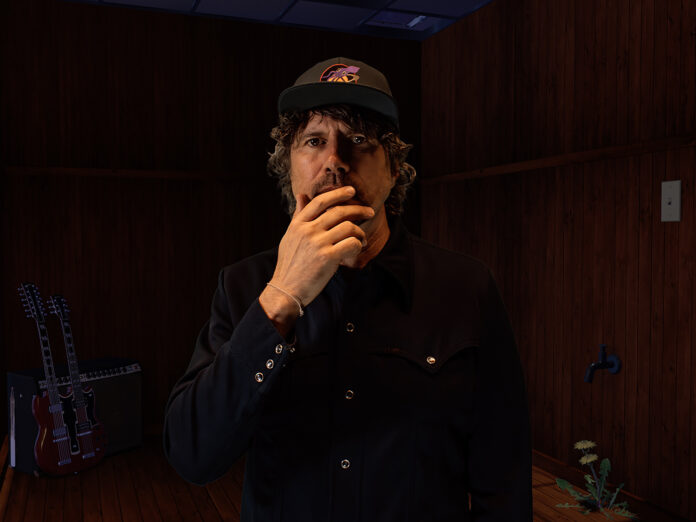A rich harvest of succour awaits on Super Furry veteran’s euphonious almanac of sorrows
A rich harvest of succour awaits on Super Furry veteran’s euphonious almanac of sorrows
NEIL YOUNG IS ON THE COVER OF THE NEW UNCUT – HAVE A COPY SENT STRAIGHT TO YOUR HOME
The process of writing from the title down is a proven way of conjuring art from a blank page. In 1994, Manic Street Preachers wrote the entirety of their final album as a four-piece after Richey Edwards and Nicky Wire decided that calling it The Holy Bible was a suitable scene-setter for the gravity of the sentiments expressed therein. In 2017, Saint Etienne’s cache of love letters to Metroland assembled itself only once the trio decided their next project would be called Home Counties. It’s interesting then, that this was also the process by which Gruff Rhys started work on the successor to 2021’s universally acclaimed concept album (about a sacred mountain on the North Korean border), Seeking New Gods.
The neon light depicted on the sleeve art reads ‘Sadness Sets Me Free’, but if it mirrored the grammatical emphasis of his 1996 hit with Super Furry Animals, “God! Show Me Magic”, and became Sadness! Set Me Free, it would shine a keener light on what Rhys has allowed himself to do here. On an album of songs that “feel melancholic or… deal with shit things,” it’s important to state that, at no point, does the listener feel like they’re taking a holiday in someone else’s misery. That’s even true of “Bad Friend”, which details a miserable caravan holiday in West Wales. It’s actually the sweetest song on the record; a string of reassurances to friends and loved ones that, although our protagonist might sometimes fall short of his own standards, “bad friends are still friends/And better than an enemy/And I will be there at the end.”
Also abundant here are qualities that ensure you’ll want to keep Sadness Sets Me Free near to your turntable in the weeks after it enters your world. Keeping the core of the group with which he’d just completed a European tour, Rhys headed straight from Dunkirk to the careworn 19th-century splendour of Paris’s La Frette Studios, where the basic songs were laid down in three days. Since 2014’s American Interior, Osian Gwynedd has established himself as the Garson to Rhys’s Bowie, the Barson to his Madness, to the extent that the songwriter appears to be leaving spaces in his songs into which he knows his keyboard player will decant something special.
Gwynedd’s mellifluous tones are the first thing you hear on the title track that opens the song, a Nashville-style rumination about the temptation to pick at the stitches of the first-world contentment which is too easily taken for granted. The fatalistic soothsaying of “Silver Lining (Lead Balloons)” and “They Sold My Home To Build A Skyscraper” are powered along by Gwynedd’s jazzy flourishes and (in the case of the former) an arrangement that suggests that Kevin Ayers’ “Song For Insane Times” might have been a tourbus staple in the preceding weeks.
Indeed, it’s by no means the only song for insane times on here. Right at the centre of Sadness Sets Me Free sit a bunch of songs that mark Rhys’s furthest incursion into dystopian territory more commonly associated with, say, Thom Yorke. Billowing out like smoke rings over the merest candle flicker of piano and a low synth hum, “Cover Up The Cover Up” invites us to depict our everyman protagonist gazing up from the rubble as helicopters carrying their cargo of discredited politicians and their oligarch enablers disappear into the clouds never to return – “aides still flapping excuses into the crowds.” On the pensive, diaphanous “The Far Side Of The Dollar”, Rhys sounds like a child reluctantly tuned into the frequency at which empty seas and infertile soil transmit their sorrow.
Here and elsewhere, heavy sentiments are leavened by a succession of hair-raising arrangements by Gruff ab Arwel. In its stately grandeur, “I Tendered My Resignation” doesn’t fall far short of Bill Shepherd’s arrangements for The Bee Gees in their early years, and it’s an analogy that carries into the song itself, which for its blending of the sublime with the ridiculous (“Sometimes doing the right thing is the opposite of doing the right thing/Sometimes it’s the wrong thing…”) evokes the heady peaks of Robin Gibb’s “I Started A Joke”.
Rhys describes another standout track, “Celestial Candyfloss”, as “an attempted pocket symphony about the cosmic lengths that people will travel in the pursuit of love and acceptance”, but there’s no “attempted” about this, and that’s also down to ab Arwel, whose presence here makes the song so much more than an affable four-to-the-floor radio rattler. None of which, by the way, is meant to diminish any credit due to Rhys for the magnitude of this achievement. If anyone’s counting, this is the 21st studio album which has featured Rhys as a songwriter and performer. But it’s hard to recall a set of songs on which Rhys’s low-key radicalism and unquenchable sense of wonder have coexisted with such ease.
On the declamatory closer “I’ll Keep Singing”, he reiterates the sentiments which birthed the preceding nine songs: “Sadness sets me free.” And as the strings echo into silence, he sounds all but cured of whatever blues he brought into the room. He won’t be the only one.



